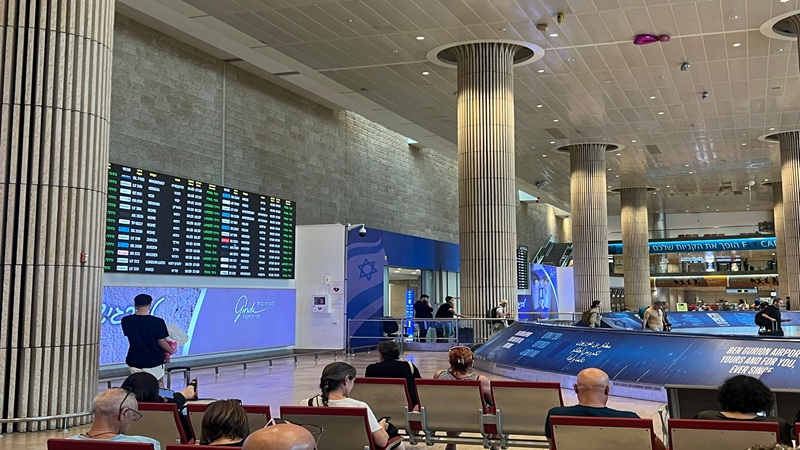Zionist media outlets have openly acknowledged the growing inability of the occupying regime to counter the escalating military operations launched by Yemen in support of the Palestinian people in Gaza. These operations, despite the vast geographic distance, have inflicted severe strategic and economic blows deep within the Israeli entity.
In a report published by the Zionist business outlet "The Marker", the site admitted that “Israel” lacks any effective solution to the threat posed by the “Houthis.” It noted that even a Zionist naval assault on the port of Hudaydah would not shift the balance of power between “Israel” and the “Houthis.” The report underscored that the United States and the United Kingdom had both failed to lift the blockade on Umm ar-Rashrash, despite deploying destroyers, aircraft carriers, and even a submarine that previously carried nuclear ballistic missiles.
The article stated, “There is no reason to believe that a naval operation will decide the battle with the ‘Houthis’ or stop the almost daily barrages of missiles and drones being launched from Yemen.”
"The Marker" website quoted the deputy commander of the enemy navy, Shaul Horev, as saying: “The Air Force has attacked Yemen five times and failed to defeat the ‘Houthis.’ Naval strikes won’t succeed either. The ‘Houthis’ present a type of threat we haven’t seen in previous wars — an enemy stationed along the coast that is imposing a blockade from there.”
The site emphasized that the damage inflicted by the “Houthis” on the entity’s maritime activity, particularly the disruption of shipping to the port of Umm ar-Rashrash, will continue even after the war in Gaza ends. It noted that anyone seeking an alternative solution should consider the political agreement previously reached between Trump and the “Houthis.”
Billions in Economic Losses
In a related report published Wednesday, the Zionist Newspaper "The Jewish Independent" revealed the extent of the Zionist entity’s inability to cope with the rising pace of Yemeni operations in support of Gaza. The paper confirmed that Yemen has become a daily nightmare for the occupying entity, striking deep inside its territory despite being over 2,000 kilometers away.
According to the report, since the beginning of the al-Aqsa Flood Operation, the Yemeni Armed Forces have carried out more than 350 offensive operations targeting Zionist territory using ballistic missiles and drones. These strikes have paralyzed the occupied port of Umm ar-Rashrash, pushing it toward complete bankruptcy due to the disruption of Asian trade routes through the Red Sea.
The escalation, the paper added, has not been limited to Umm ar-Rashrash. A spokesperson for the Yemeni Armed Forces recently announced that Haifa Port, located deep within the Mediterranean, would become the next target for missile strikes should the Zionist aggression on Gaza persist.
The report also indicated that Yemeni strikes have disrupted operations at Lod Airport (Ben Gurion). Ballistic missiles hit the airport’s infrastructure directly, creating deep craters in sensitive facilities. This damage led to the withdrawal of more than 14 international airlines from the Zionist market, including major European carriers such as Lufthansa and Ryanair, causing economic losses estimated in the billions of dollars.
Despite Zionist attempts to conduct airstrikes on Yemeni territory, the newspaper admitted these attacks have had no measurable impact on Yemen’s military capabilities or its resolve — a determination that only grows stronger the longer the aggression continues.
In closing, the report warned that Tel Aviv is now incapable of opening a direct front with Yemen and cautioned that any military adventurism against Iran would push the Israeli entity into deeper international isolation, especially amid growing uncertainty over continued U.S. support in light of shifting positions in Washington.
The paper affirmed that settlers must now learn to live with daily sirens and recurring missile strikes across occupied territories, clinging to a waning hope that their missile defense systems can intercept the incoming projectiles — a hope that is increasingly unrealistic in the face of Yemen’s growing accuracy and capabilities.
Collapse of Air Travel Sector Deepens Israeli Troubles
Zionist media further reported that the exodus of international airlines has tightened the economic and logistical stranglehold on the occupying entity, adding to its broader financial crises.
As Yemeni operations continue under the framework of a full aerial blockade, international carriers have been suspending flights to Zionist airports one after another, from major global airlines to budget-friendly carriers, worsening the hardships faced by the occupation regime.
The Zionist business newspaper "Globes" confirmed that the continued suspension of flights by foreign low-cost carriers represents a serious blow to settlers who need to travel. It explained that the absence of these carriers has led to higher ticket prices and the cancellation of numerous travel destinations.
The report highlighted that EasyJet, a major low-cost airline, has suspended its flights and was the only carrier operating direct routes from occupied Yaffa to Basel and Geneva. Ryanair has also extended its suspension and was the only airline offering direct flights to cities such as Bologna, Turin, and Naples in Italy.
Meanwhile, the Zionist travel and tourism website "Lametayel" noted that “Israelis are facing the most expensive year ever in the aviation sector,” emphasizing that budget carriers have no plans to resume service and that “Israelis now feel deeply disappointed.”
These developments followed an announcement by British low-cost airline EasyJet on Tuesday evening, confirming it would extend its boycott of Israeli airports until at least July 31. The extended timeline reflects the growing conviction among global airlines that the Zionist regime remains incapable of halting the ongoing Yemeni operations.







